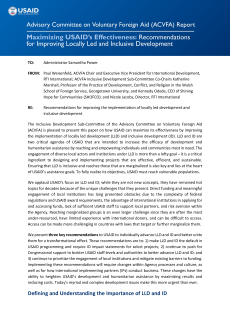TO: Administrator Samantha Power
FROM: Paul Weisenfeld, ACVFA Chair and Executive Vice President for International Development, RTI International; ACVFA Inclusive Development Sub-Committee Co-Chairs Katherine Marshall, Professor of the Practice of Development, Conflict, and Religion in the Walsh School of Foreign Service, Georgetown University, and Kennedy Odede, CEO of Shining Hope for Communities (SHOFCO); and Nicole Jacobs, Director, RTI International
RE: Recommendations for improving the implementation of locally led development and inclusive development
The Inclusive Development Sub-Committee of the Advisory Committee on Voluntary Foreign Aid (ACVFA) is pleased to present this paper on how USAID can maximize its effectiveness by improving the implementation of locally led development (LLD) and inclusive development (ID). LLD and ID are two critical agendas of USAID that are intended to increase the efficacy of development and humanitarian assistance by reaching and empowering individuals and communities most in need. The engagement of diverse local actors and institutions under LLD is more than a lofty goal – it is a critical ingredient to designing and implementing projects that are effective, efficient, and sustainable. Ensuring that LLD is inclusive and reaches those that are marginalized is also key and lies at the heart of USAID’s assistance goals. To fully realize its objectives, USAID must reach vulnerable populations.
We applaud USAID’s focus on LLD and ID; while they are not new concepts, they have remained hot topics for decades because of the unique challenges that they present. Direct funding and meaningful engagement of local institutions has long presented obstacles due to the complexity of federal regulations and USAID award requirements, the advantage of international institutions in applying for and accessing funds, lack of sufficient USAID staff to support local partners, and risk aversion within the Agency. Reaching marginalized groups is an even larger challenge since they are often the most under-resourced, have limited experience with international donors, and can be difficult to access. Access can be made more challenging in countries with laws that target or further marginalize them.
We present three key recommendations to USAID to individually advance LLD and ID and better unite them for a transformational effect. These recommendations are to: 1) make LLD and ID the default in USAID programming and require ID impact statements for select projects; 2) continue to push for Congressional support to bolster USAID staff levels and authorities to better advance LLD and ID; and 3) continue to prioritize the engagement of local institutions and mitigate existing barriers to funding. Implementing these recommendations will require changes within Agency processes and culture, as well as for how international implementing partners (IPs) conduct business. These changes have the ability to heighten USAID’s development and humanitarian assistance by maximizing results and reducing costs. Today’s myriad and complex development issues make this more urgent than ever.

